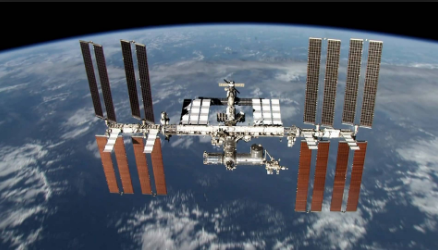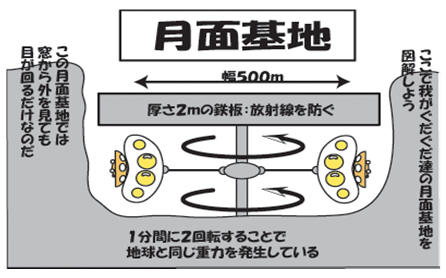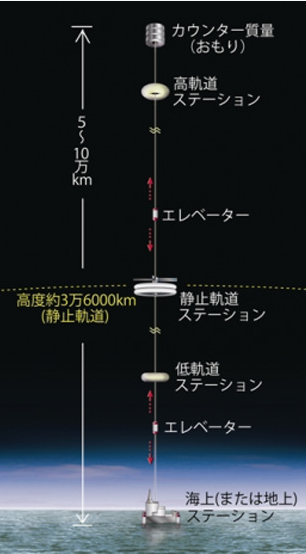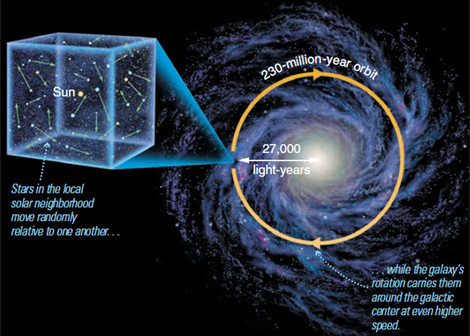68-1 Colonization in the solar system
68-1-1 International Space Station (ISS)(1999~2024)) [1]
・Altitude:400 km
・Crew: 6 people
・Weight:420t
・Participating countries:USA, Russia, the European Space Agency, Canada, Japan
・It requires little replenishment of water by also play the water from the urine not only the condensed water in the air. [2]
・Additional crewmembers are transported to the ISS by Soyuz.
・Total cost: 154 billion dollars [2]

※ISS [3]
68-1-2 Earth’s Moon
○Google and the X Prize Foundation will hold the moon unmanned exploration race "Google Luna • X Prize (GLXP)"! [4]
・Race participants compete to send high-definition images and videos to the earth until the end 2017.
・Grand Prize $20 million
○About the Moon [5]
・Average distance from Earth: 380,000 km
・Travel time:3 days
・Gravity:1/6 of that found on Earth
・Atmosphere:With too sparse an atmosphere to impede impacts, a steady rain of asteroids, meteoroids and comets strikes the surface of the moon.
・Water:In 2009, orbiting spacecraft discovered water molecules on the moon.
・Oxigen:The crust is made of oxygen, silicon, magnesium, iron, calcium and aluminum, with small amounts of titanium, uranium, thorium, potassium and hydrogen.
・Radiation:It does not provide any protection from the sun's radiation.
・Long ago the moon had active volcanoes, but today they are all dormant and have not erupted for millions of years.

68-1-3 Mars
68-1-3-1 Mars One[6 ][7]
○Mars One aims to create a permanent human colony on Mars in 2027
○Roadmap
2016 Latest tests will cut candidates down to just 40 - 24 of whom will make the trip
2017 The first teams of candidates are expected to be selected and start training.
2020 A demonstration mission is sent to Mars to test technologies, while a satellite is placed into Martian orbit.
2022 A rover is launched to Mars to find a settlement location.
2024 Mars One sends a second rover, two living units, two life support systems and a supply unit to Mars, to form the habitat.
2027 First humans land on Mars
2028~ Additional 2crews will land every two years.
○Mars One is possible with conventional technology, but funding is a problem.
・Cost: $ 6 billion
(Funds are raised in broadcasting rights and donations.)
(So far, it has raised $ 780,000.)
68-1-3-2 SpaceX [8]
○The SpaceX CEO has unveiled a vision for the colonization of Mars that he says will involve hundreds of reusable craft, each carrying somewhere between 100 and 250 colonists or so and also producing fuel from available resources on Mars for the return trips.
○Roadmap
2018 Unmanned missions could commence.
68-1-3-3 About Mars [9]
・A trip to Mars:6–7 months
・Diameter:half of the Earth
・Gravity:about 40% of the Earth
・Rotation period:24 hours and 40 minutes
・Satellites, two (Deimos, Phobos)
・Air:0.75% of the Earth (95% carbon dioxide, 3% nitrogen, 1.6% argon)
・Water:there is ice in the basement.
・Due to the lack of a magnetosphere, solar particle events and cosmic rays can easily reach the Martian surface.
・Rradiation levels in orbit above Mars are 2.5 times higher than at the International Space Station.
68-1-4 Space elevators
○Now, why do we need space elevators?
○Because transportation cost of space elevator is 1/160 of the rocket.
※Transportation cost of space elevator::5million~10 million$/t(Falcon:1.6billion$/t) [10]
○In 2012, the Obayashi Corporation announced that in 38 years it could build a space elevator using carbon nanotube technology. At 200 kilometers per hour, the design's 30-passenger climber would be able to reach the GEO level after a 7.5 day trip. [10]
○An Earth-based space elevator would consist of a cable with one end attached to the surface near the equator and the other end in space beyond geostationary orbit (35,800 km altitude). [10]
○To construct a space elevator on Earth the cable material would need to be both stronger and lighter. [10]
※ The length of the cable: 144,000km, weight :7,000t
○The estimated construction costs would be $10 billion.

※宇宙エレベーター [11]
68-2 Alpha Centauri [12]
○Alpha Centauri (α Cen) is the closest star system to the Solar System at 4.37 ly. It consists of three stars
○Mass and Age
・A:1.1M(the mass of the Sun)、4.85 billion years
・B:0.907M、4.85 billion years
・C (Proxima):0.123M、4.85 billion years
○Reaching period:30,000 years
○About 25,000 years later, Alpha Centauri will be 3.26 ly away.
○If you think the energy and safety between the long-term move, it is necessary to utilize the forces of nature.
→No.80 Starship Solar-System(SSS)
68-3
○The Sun lies at a distance of 25,000–28,000 light-years from the Milky Way Galactic Center. The Milky Way is a barred spiral galaxy that has a diameter usually considered to be about 100,000–120,000 light-years
・The Milky Way contains over 200 billion stars.
☆Depending on the movement of neighborhood stars, there is a possibility that the sun is close to the other stars.

※The monement of the local solar neighborhood [13]
68-4 Collision with Andromeda Galaxy [14]
○In about four billion years, the Milky Way will collide with its nearest neighbor, the Andromeda Galaxy. The two are rushing towards each other at about 112 km per second.
○After the Collision the two galaxy should settle into a smooth elliptical galaxy.
68-5 News
○A diamond planet was found![15]
・This planet is only 40 light-years away.
・It takes 300,000 years for one way, 600,000 years for round trip by the spacecraft.
☆Hasten the development of the Hayabusa-Z!
【Referendes】
1. Tim Sharp”International Space Station: Facts, History & Tracking“at Space.com 2160405
http://www.space.com/16748-international-space-station.html
2.Wikipedia:国際宇宙ステーション
3.”The International Space Station: Together is the Future” NASA
https://www.youtube.com/watch?v=NtrVwX1ncqk
4. "Google Luna • X Prize (GLXP)"
http://lunar.xprize.org/about/overview
5. Moon: Home - NASA
http://solarsystem.nasa.gov/moon/moonfacts.cfm
6.MARK PRIGG FOR DAILYMAIL.COM “The final countdown for Mars One: 100 remaining candidates for controversial one way trip to undergo 'intense' testing” 20160606
http://www.dailymail.co.uk/sciencetech/article-3628235/The-final-countdown-Mars-One-100-remaining-candidates-controversial-one-way-trip-undergo-intense-testing.html
7. Mars One
http://www.mars-one.com/mission/roadmap
8. Sid Perkins”Elon Musk’s path to Mars begins with Red Dragon—but what science will it do?”at Science 20160927
http://www.sciencemag.org/news/2016/09/elon-musk-s-path-mars-begins-red-dragon-what-science-will-it-do
9. Wikipedia:C olonization of Mars
https://en.wikipedia.org/wiki/Colonization_of_Mars
10. Wikipedia:Space elevator
11. 石井 英男”宇宙エレベーターが実現する「2050年宇宙の旅」” at TELESCOPE Magazine 2013
http://www.tel.co.jp/museum/magazine/spacedev/130603_topics_07/
12.Wikipedia:Alpha Centauri
13. BhavanaJagat
https://bhavanajagat.com/2015/01/01/happy-new-year-the-perception-of-time/
14. Nola Taylor Redd” The Andromeda Galaxy (M31): Location, Characteristics & Images”at SPACE.com 20120508
http://www.space.com/15590-andromeda-galaxy-m31.html
15. Caterina Visco” Il pianeta di diamante”at WIRED 20120812
http://daily.wired.it/news/scienza/2012/10/12/pianeta-diamante-123456.html
0 件のコメント:
コメントを投稿